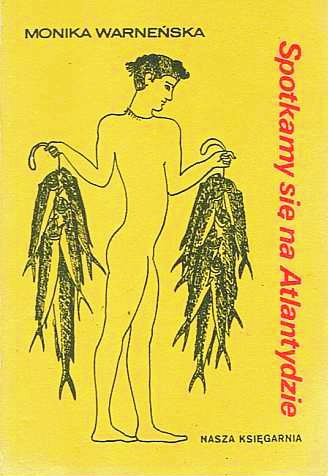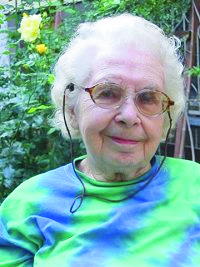Title of the work
Country of the First Edition
Country/countries of popularity
Original Language
First Edition Date
First Edition Details
Monika Wareńska, Spotkamy się na Atlantydzie. Warszawa: Nasza Księgarnia, 1988, 255 pp.
ISBN
Genre
Bildungsromans (Coming-of-age fiction)
Illustrated works
Novels
Target Audience
Young adults
Cover

Courtesy of Nasza Ksiegarnia, publisher.
Author of the Entry:
Summary: Helena Płotek, University of Warsaw, helenaplotek@student.uw.edu.pl
Analysis: Karolina Anna Kulpa, University of Warsaw, k.kulpa@al.uw.edu.pl
Peer-reviewer of the Entry:
Katarzyna Marciniak, University of Warsaw, kamar@al.uw.edu.pl
Elżbieta Olechowska, University of Warsaw, elzbieta.olechowska@gmail.com

Małgorzata Karkowska (Illustrator)

Monika Warneńska, courtesy of the Photograph by Mariusz Kubik, retrieved from Wikipedia Commons (accessed: June 28, 2018).
Monika Warneńska
[Pen-name of Kazimiera Jelonkiewicz] , 1922 - 2010
(Author)
She was born March 4, 1922 in Myszkowo near Zawiercie (Upper Silesia) and died April 9, 2010 in Warsaw. Her real name was Kazimiera Jelonkiewicz, née Kosińska. She authored many books for young adults. She is best known for her journalistic work in Asia and the Far East.
From 1925 on she lived in Sosnowiec. During the German occupation she cotinued her studies in the underground educational system, focusing on the humanities. After the liberation of Poland she moved to Warsaw where she completed high school. She received her MA in history from the University of Warsaw. She debuted in 1945. Throughout the years she worked as a journalist for many newspapers and other periodicals; she was an editor at Polska Zbrojna, Trybuna Ludu, Perspektywy. She wrote for Płomyk, Przyjaciółka, Przyjaźń, Dziennik Ludowy. From 1950 she mainly used her pseudonym Monika Warneńska. From 1954 she travelled to Korea (1954, 1957), Vietnam (1962, 1965), Cambodia (1966), Laos (1969), Mongolia (1962, 1972), and Cuba (1972). She published many travel diaries and letters from these trips in Poznaj Świat, Kontynenty, Przekrój, Kultura, Dookoła Świata, Fakty, and Kontrasty. She published also in many foreign magazines, mainly in the Soviet Union.
She was the winner of multiple awards, among them, the Education and Arts Ministry Award, Third Grade (1967); the Foreign Reporters Club Award (1968); the Grand Prix Award of the International Organization of Journalists (1969); the Ministry of Defense Award (1974); the Prime Minister Award for Young Adult Fiction (1982). She was a very close friend of another Polish writer Halina Rudnicka.
Sources:
"Monika Warneńska", in Jadwiga Czachowska; Alicja Szałagan, eds., Współcześni polscy pisarze i badacze literatury. Słownik biobibliograficzny, vol 9: W–Z, Warszawa: Wydawnictwa Szkolne i Pedagogiczne, 2004, 41–46.
"Monika Warneńska", in Lesław M. Bartelski, Polscy pisarze współcześni, 1939–1991. Leksykon, Warszawa: Wydawnictwo Naukowe PWN, 1995, 446–448.
"Monika Warneńska", in Jadwiga Czachowska, ed., Słownik współczesnych pisarzy polskich, ser. II, vol. 3: U–Ż, Warszawa: Państwowe Wydawnictwo Naukowe 1980, 17–24.
Bio prepared by Helena Płotek, University of Warsaw, helenaplotek@student.uw.edu.pl
Summary
Based on: Katarzyna Marciniak, Elżbieta Olechowska, Joanna Kłos, Michał Kucharski (eds.), Polish Literature for Children & Young Adults Inspired by Classical Antiquity: A Catalogue (accessed: June 11, 2021), Faculty of “Artes Liberales”, Warsaw: University of Warsaw, 2013, 444 pp., section by Helena Płotek, pp. 406–407.
The story begins when the young protagonist Alekos Dragumis is travelling to Greece by train. He is the son of a deceased Greek father and a Polish mother. His father reached Poland after WW2, in which he was as a guerilla fighter. This past forced him to leave Greece forever. Before the war, he was studying archaeology and he passed on to his son his love for archaeology and history. Alekos is crossing the Greek border. His father’s family invited him to spend his vacations with them. He does not know either his father’s family or his cultural heritage. His journey is the fulfilment of his dream about Greece. He travels through Thessalonica, Athens, to Santorini (the Atlantis from the title) and to Crete. In addition to meeting his father’s family, Alekos visits many Greek historical places – for example, Marathon, Mykonos and Knossos. Each visit to a museum is described in great detail, including ancient Greek stories and myths.
There is a secondary storyline in the book concerning two Polish tourists. In Thessaloniki Alekos meets by chance a mother and daughter – he will meet them again several times and they will go sightseeing together. Alekos meets also Professor Karinatos, his father’s archaeology teacher. The professor is working on interesting archaeological digs on Santorini, where he invites Alekos. The boy learns how difficult and time consuming it is to excavate ancient objects and what life looked like on the island in ancient times. He also learns about the history of the island, identified sometimes with the legendary Atlantis. Alekos’ Greek family treats him very well. His grandfather even suggests that he could stay on in Greece for good. Alekos doesn’t want to remain there because he doesn’t want to abandon his Polish family and his birthplace. He receives though an invitation for his mother and his Polish grandfather to spend their vacations in Greece.
Analysis
Wareńska’s novel includes interesting descriptions of ancient Greek architecture. Simple everyday language and many dialogues combined with an engrossing plot make the reading very enjoyable for younger and older readers. The book is illustrated by a few drawings by Malgorzata Karkowska, such as a map of Santorini and of ancient monuments, including frescos. The publication from 1988 is the only edition of this book.
One of the most interesting aspects of Monika Wareńska’s novel is a presentation of the impact of historical events on the fate of Alek’s family and on his own life. First, his father with his wife Maria, were part of armed resistance during WW2 and of ELAS (the communist Greek People's Liberation Army) in the Greek Civil War in 1946–1949. After ELAS defeat they had to leave the country. This Greek couple stayed as refugees in communist Poland, like many of their fellow countrymen (pp. 54, 84); Maria died of tuberculosis and Alekos senior also got ill and had to be treated in a sanatorium (pp. 13–15). There he met his future second wife (Alek’s mother) and father-in-law. Mr Złotowski as a teacher had a classical education, he could speak ancient Greek and knew the ancient history very well (p. 14), as it was included in the Polish system of education before WW2. He had a big library about myths and history of Greece (p. 16) and wanted to visit Homer’s homeland, but the Iron Curtain restrictions made it impossible to travel abroad from Poland, especially to “hostiles countries,” member states of NATO. It is also emphasized that Mr Zlotowski read Homer in the original (p. 73). The contact between families in Poland and Greece was difficult, almost impossible, which had an impact on young Alek. When his father died, the bond with his Greek origins was broken off for many years and contact with the family could be established only after the political situation changed. The number of Polish tourists (e. g., p. 32), whom Alek meets during his trips through Greek islands.
There are numerous references in the novel to Graeco-Roman mythology and history, starting with the names of characters, including the main figure called, after his father Alek or Alekos (diminutive from Alexander); Nike, name of a Greek girl whom he met on a train to Thessalonica or names of Alek’s uncle- Achilleas, a normal modern usage in Greece but one that reminds a Polish reader of antiquity. The author also describes many Greek monuments, for instance, the treasure found in a grave near Derveni (p. 56); she also gives a poetical description of Thira (Atlantis) on p. 61, or of the Athenian Acropolis (pp. 96–101) and an Athenian museum (pp. 117–124), but also recalls a Polish connection to ancient mythology, the Warsaw Siren (p. 64). When prof. Karintos tells Alek about his archaeological research on Thira he compares his work to following Ariadne’s thread (pp. 172–173). He also mentions Polish excavations at Faras, where prof. Kazimierz Michałowski had found beautiful frescos, which we can now admire at the National Museum in Warsaw (p. 211).
The author presents Alekos as a teenage boy, who for the first time visits his father’s family in Greece and tries to shape his own identity from a combination of two different cultures, Greek and Polish. On one side he perceives himself as a Pole, while looking like a stereotypical Greek; this leads to some uncomfortable situations when he has to explain his origin (for instance on p. 31). On the other, he wants to meet his father’s family, especially the grandfather looking like Zeus on pictures from a mythology book (p. 71); he wants to improve his Greek because his father didn’t manage to teach him and Aleks knows only English (p. 12). When he visits ancient places and archaeological sites on Thira, where prof. Karinatos conducts his research, he spiritually meets with his deceased father. He dreams about becoming an archaeologist like Alekos senior wanted to be. At the beginning of the book, he seems to be internally torn and he struggles with his father’s past, his own identity and what he should do about his future. He thought that he had to choose between his Greek and Polish origin. But in the end, he decided to stay in Poland to study archaeology. His Greek grandfather supports this choice and invites to Greece Alek’s mother and Polish grandfather, so Zlotowski’s dreams come true. Kostas also very clearly declares his financial support should it become necessary, as people do in real families. Alek understands that his double origin doesn’t have to provoke internal conflicts, because of his Polishness and Greekness form equal parts of his identity. They made him the person that he is, which becomes obvious during the recitation of the Polish poem Maraton [Marathon] by Kornel Ujejski (pp. 107–110). On Atlantis, he meets his new self.


